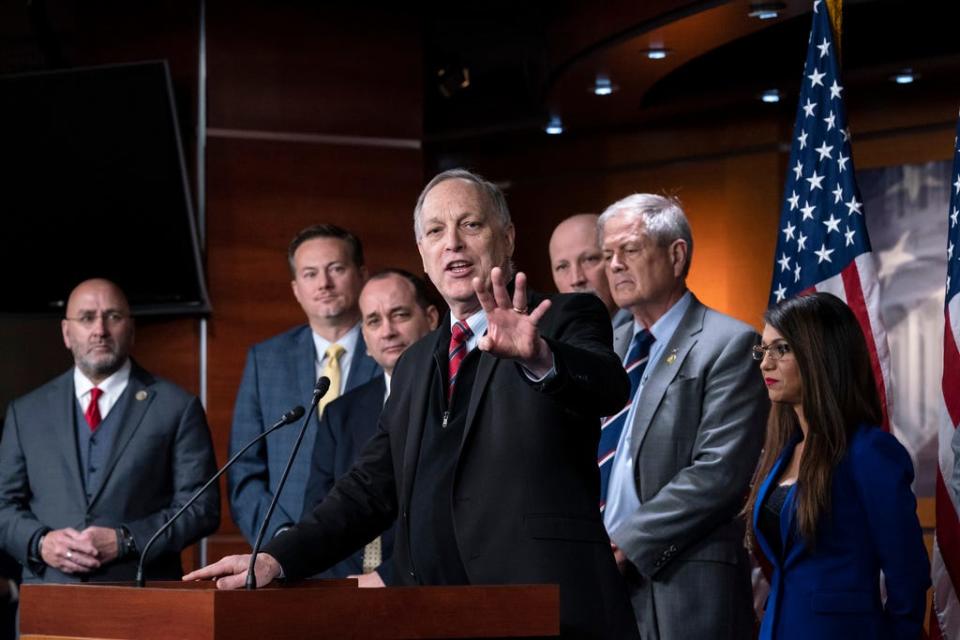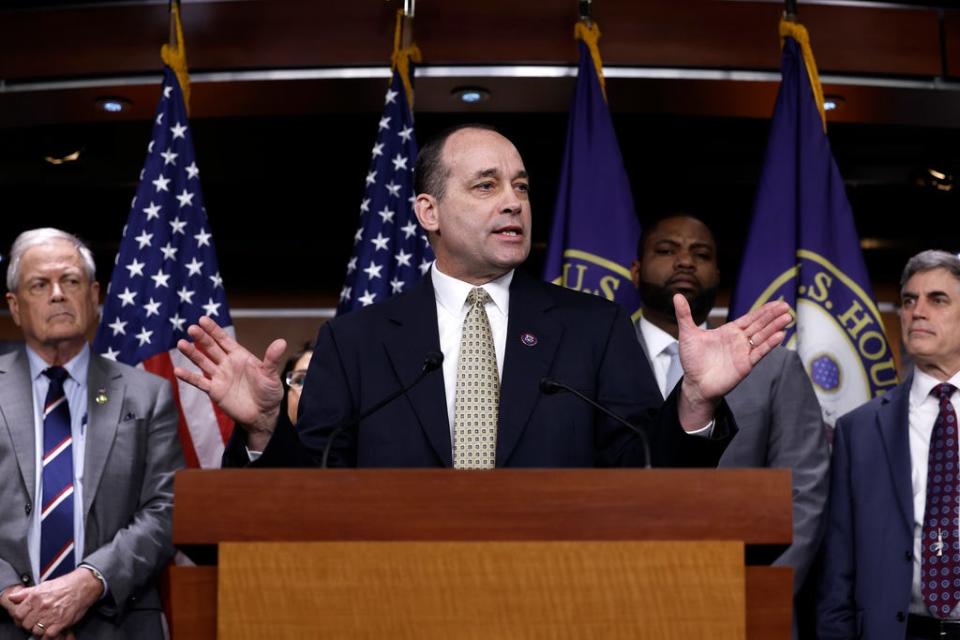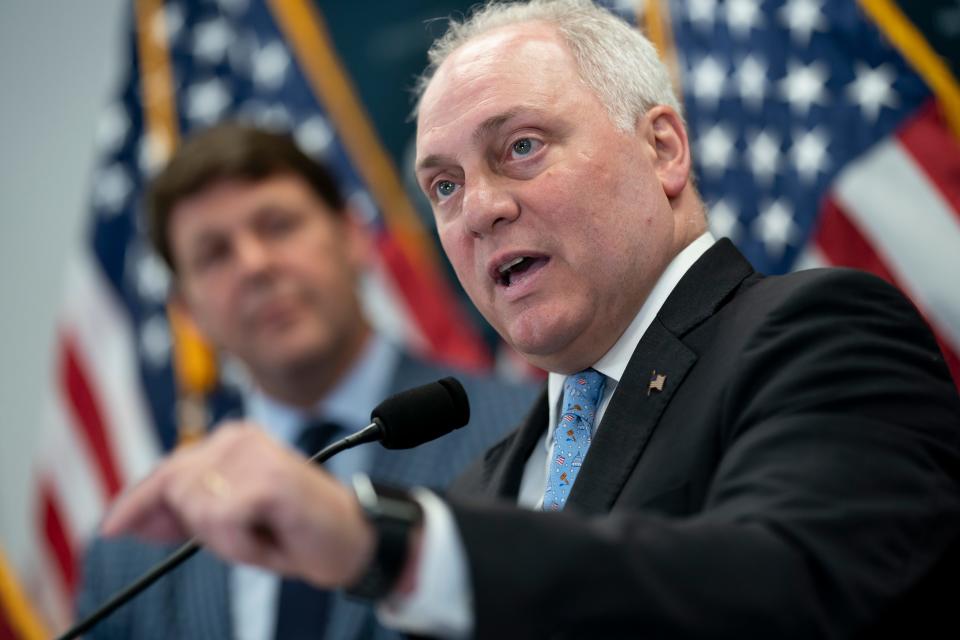Is there going to be a government shutdown? What Congress is saying about the latest funding fight
WASHINGTON — Congress is out for its August recess but lawmakers will have a monumental task ahead of them when they return to Washington in September – funding the federal government.
Once lawmakers get back to Capitol Hill in mid-September, the House and Senate will be in session for roughly three weeks until the Sep. 30 deadline to pass a federal budget. On Oct. 1, a new fiscal year begins. If lawmakers cannot push through 11 out of 12 separate spending bills, after passing just one before the August recess, the country will face a government shutdown.
However, lawmakers could pass a continuing resolution, which would avert a shutdown and fund the government at current levels until an agreed upon date.
But with a deeply divided Republican-controlled House and Democratic-controlled Senate, it is unclear whether lawmakers can avert a shutdown in time. The outcome is even murkier with some Republicans from the House Freedom Caucus, a group of the most conservative lawmakers, either openly welcoming a shutdown or dismissing concerns about one.
“We should not fear a government shutdown," Rep. Bob Good, R-Va., a member of the Freedom Caucus said at a press conference last week. "Most of the American people won't even miss if the government is shut down temporarily."
Here's how lawmakers are progressing in funding talks and how a government shutdown could affect you.

What are House lawmakers fighting about?
The major fight on government spending is happening in the House, where Republicans hold a slim five-seat majority.
Members of the House Freedom Caucus have been demanding deeper cuts across the board from House GOP leadership after the debt ceiling negotiations between House Speaker Kevin McCarthy, D-Calif., and President Joe Biden. Hardline conservatives felt like they were left out of those conversations.
“We gave up all that leverage,” Good told reporters last week about the debt ceiling negotiations. With the funding debate coming up in September, Good urged his colleagues to leverage a shutdown.
“If (a government shutdown) is a requirement to break bad habits, so be it. And this town has a bad habits problem,” Rep. Byron Donalds, R-Fla., another member of the Freedom Caucus, told reporters last Tuesday.
Another sticking point for House conservatives is their insistence on leadership to vote on 12 separate bills funding the government as opposed to one large “omnibus” spending bill, a practice Congress has become accustomed to over past years. Voting on the 12 separate bills was a key concession McCarthy made to Freedom Caucus members in his pursuit of the speakership back in January − a position he won after 15 historic rounds of voting.
Rep. Matt Rosendale, R-Mo., another member of the Freedom Caucus, said he will refuse to approve any funding legislation until all 12 bills are moved out of committee so he can see the total cost of spending.

Will Congress take steps to buy more time?
One option if Congress cannot come to a deal before Sep. 30 is to pass a continuing resolution, which will keep funding at or close to current levels to buy lawmakers more time at the negotiating table.
Rep. Garret Graves, R-La., a key GOP leadership ally and negotiator during the debt ceiling discussions, said last Wednesday he would only consider a continuing resolution for a “limited time.”
“It’s not my first preference,” Graves told USA TODAY, adding a continuing resolution would extend Democratic policies from last year's spending bill when Democrats still controlled the House which he said was not “in our interest.”
Even then, it is uncertain whether a continuing resolution could pass. Some members from the House Freedom Caucus, including Rep. Andy Biggs, R-Ariz., and Rep. Ralph Norman, R-S.C., have said they have no plans to support a continuing resolution. Other lawmakers, when asked, have avoided discussing the idea.
House Majority Leader Steve Scalise, R-La., said lawmakers from both the House and Senate should start negotiations during the August recess to beat the Sep. 30 deadline.
“We can be starting those negotiations over the August work period and then come back in September to finish what’s left,” he said during a press conference last week.

What can pass in both chambers?
House Republicans have been pushing through a litany of amendments with deeper spending cuts related to conservative culture wars, such as limiting abortion access for service members and blocking the VA from displaying pride flags.
The ambitious policy changes have little to no chance of passing the Democratic-controlled Senate. The White House has already issued a veto threat for one appropriations bill the House passed along party line votes last Thursday.
Rep. Steny Hoyer, D-Md., told USA TODAY Democrats won’t support spending bills if Republicans “put cultural stuff in there.”
“They know that and they will be perceived as responsible for shutting down the government, which I think hurts them politically,” Hoyer said.
He added that a government shutdown is "not just bad policy, it's stupid."
Congressional Progressive Caucus chair Rep. Pramila Jayapal, D-Wash., said the country could see a shutdown because of the far-right GOP, adding that many amendments they are pushing for are stripping freedoms away from Americans.
"It's offensive," she said. "It is not what the American people need and they have no interest in trying to legislate for what we actually need to do in this body."
McCarthy has dismissed concerns that the House’s spending plans have no chance in the Senate, telling reporters before the August recess that he met with Senate Majority Leader Chuck Schumer, D-N.Y., to begin negotiations early to avoid a shutdown.

What does a government shutdown do?
If the government shuts down, you can expect various government functions to slow down.
But every shutdown slightly differs. The Office and Management and Budget coordinates plans for a shutdown developed by each federal agency. These plans are updated on a rolling basis.
The OMB tells the agencies what functions must continue under certain exceptions, such as being considered essential or being a program that does not require annual authorization from Congress.
Federal employees who do not work in services considered essential are prevented from doing their jobs and those who are considered essential see their paychecks paused. During the 2018-2019 government shutdown, around 800,000 federal employees were either furloughed or working without pay. After the shutdown ends, those employees receive retroactive pay for the length of the shutdown.
Some of the services considered essential include flights, border patrol, Social Security and Medicare benefits. Workers involved in those services, such as air traffic controllers, work without pay.
But even those essential services could be impacted by a shutdown as well. During the 2018-2019 government shutdown, which lasted 35 days and was the longest shutdown, some TSA agents and air traffic controllers were unable to work due to financial limitations, resulting in crowded airports, flight delays and terminal closures.
Among other ways a shutdown could affect you:
National parks: Some national parks might close and others could offer limited services.
Small businesses: Small business owners will be unable to either access or apply to small business loans.
Homebuyers: Processing times could be slower for prospective homeowners looking for a mortgage insured by the Federal Housing Administration.
Food inspections: The Food and Drug Administration will have to halt food inspections, potentially impacting the country’s food supply.

Government shutdown history: What happened in the past?
The past few government shutdowns have been over specific policy disputes. Heading into September, it is unclear what the main point of contention will be in Congress.
Dec. 2018 - Jan. 2019: This was the longest government shutdown in the history of the U.S., lasting 35 days. Former President Donald Trump pushed for funding for construction of a wall on the southern border but Democratic lawmakers refused to support any spending bill with provisions for a wall. Trump ultimately declared a national emergency to bypass Congress and finance the wall.
Jan. 2018: The government shut down for three days. Democratic lawmakers attempted to pressure Trump to protect recipients of the Deferred Action for Childhood Arrivals program, undocumented immigrants who came to the U.S. as children. The shutdown was resolved after then-Senate Majority Leader Mitch McConnell, R-Ky., promised Democrats to continue negotiations and hold a floor vote on immigration reform.
Oct. 2013: The government shut down for 17 days. Republican lawmakers, who were heavily opposed to former President Barack Obama's then-new health care law, the Affordable Care Act, attempted to delay the implementation of the legislation. GOP leadership ultimately backed away from its fight as the shutdown progressed.
In the Senate, 'cooler heads will prevail'
Several senators from both sides of the aisle, however, told USA TODAY they do not think a government shutdown is likely.
Sen. Tim Kaine, D-Va., said there are “zero” chances of a shutdown.
“We did a bill a couple of years back that guarantees all federal employees get paid if there’s a shutdown,” Kaine said. “So why would you shut the door and still pay people to not come into the office and serve their fellow Americans?”
Sen. Lisa Murkowski, R-Alaska, said she is “not planning on a government shutdown.”
“Won’t happen,” said Sen. Lindsey Graham, R-S.C. “I don’t think anybody benefits from a government shutdown.”
“Cooler heads will prevail,” he added.
This article originally appeared on USA TODAY: Government shutdown 2023: What Congress is saying about funding fight

